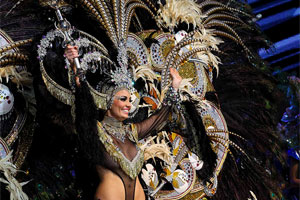Jarramplas Festival

Jarramplas is undoubtedly the most important festival in Piornal, one of its hallmarks. It is held every 19 and 20 January in honour of San Sebastián.
Jarramplas is a character wearing a conical mask, with horns, a horse's mane and a pointed nose, wearing a costume of coloured ribbons and a drum and going through the main streets of the village while the villagers and visitors throw turnips at him.
How long has it been celebrated?
Several theories have been put forward to try to justify the origin of this festival. According to anthropological research, it may even have originated before the Christianisation of the area. Although the most popular and accepted theory, both by scholars who have dealt with the subject and by the Piornalegos/as themselves, is that of a cattle thief who was captured by the villagers. Moreover, we cannot forget its relationship with Christianity and Saint Sebastian, since on the one hand it emulates the martyrdom suffered by the saint when he is tied to the trunk and throws arrows at him; and on the other hand it symbolises the expulsion of evil.
What does the festival of Jarramplas consist of?
On the 19th and 20th of January, Jarramplas goes through the streets of Piornal and the whole village prepares for the turnip rain. The first day, 19th January, dawns with the sound of the tambourine and Jarrramplas, without mask and without armour, accompanied by the butlers, friends and/or relatives, goes around the town asking for offerings for the Saint. The first departure of this character takes place around 10:30 in the morning, being for many the most awaited.

At 16:00 the rosary is celebrated in honour of the patron saint of the fiesta, where the "alborá" is sung while the saint is dressed. When the rosary ends, Jarramplas comes out again, where again, different people dress up until 19:00 approximately, when the evening is falling and the moment of the "regocijo" approaches. Jarramplas again without mask and without armour, makes a small tour to the sound of the tamboril, bursts of rockets and peals of bells, a constant and cheerful song is sung: "...le lerele le lerelé, le lerele le lerelé..." the increasingly faster pace to the beat of the harmony brings this moment of the festival to an end, once again at the church door.
At 12 midnight on this day, one of the most emotional moments of the festivity arrives: "las alborás" in the church square. Jarramplas, again without mask and without armour, with his costume and tambourine, prays, together with the stewards, family members and all the people who wish to accompany him. To the sound of the tambourine, never turning his back, he makes a small route while the whole village sings the "alborás".
After the "alborás", the "migas" (breadcrumbs) are distributed and then those who participate more directly in the fiesta, such as the stewards and friends of "Jarramplas", make a tour of the village, stopping at the homes of relatives and friends to collect food.
At dawn on the 20th, after the third warning rocket, "Jarramplas" makes its first outing of the day. Today, the day of San Sebastián, the punishment will be dedicated solely and exclusively to the person who signed up to be punished some years before, who will leave his house and make a brief appearance until he reaches the church where the High Mass will take place.
Before the mass, the procession takes place in which "Jarramplas", without a mask, plays the tambourine without taking his eyes off San Sebastián. Both protagonists face each other, together with the whole village, walk along the frequent route through the old quarter, singing the verses of the "alborás". When they arrive back at the church, the Saint is auctioned off and carried on his shoulders to enter the church.
The inhabitants of Piornal are truly devoted to this martyr and during the auction considerable amounts of money are offered. The relatives of "Jarramplas" and the stewards are the ones who offer the most money. They see the bidding as a way of paying the saint in exchange for the spiritual protection of their relative or friend when he is punished.
Curiosities of the Jarramplas festival
- Jarramplas is a voluntary event. They can be men or women, the only premise is that they must be from Piornalega. Currently, there is a waiting list until 2047. The reasons for signing up are different, whether it is a command or promise, family tradition or simply because they like it or because they are devoted to it.
- The turnips are harvested in Jarandilla de la Vera, and this year (2020) around 28,000 kilos have been brought in.
- It is a private festival, i.e. it is paid for by the stewards and Jarramplas, except for the posters and turnips, which are paid for by the Town Hall through the Cáceres Provincial Council.
- It is said that it was a festival dedicated to children under 14 years of age, but as time went by the older ones were pulling away and they had to look for alternatives so that the festival would not disappear.
- The "quintos" are in charge of distributing the turnips at strategic points where Jarramplas will pass, together with a worker from the town hall.
- After the alborá, migas are handed out free of charge to everyone.
- There can be a maximum of three Jarramplas, as there are three departures from the church (the most important ones).
- Mozas who sing and a child who repeats: a group of women are in charge of singing the rosca and the alborá, together with a small child who repeats the last words of each verse.
- The town has a Jarramplas Museum and a sculpture in the Plaza de la Constitución.
- It was declared a festival of national tourist interest in 2014.
- 2021 there is no Jarramplas, it is postponed until 2022.




